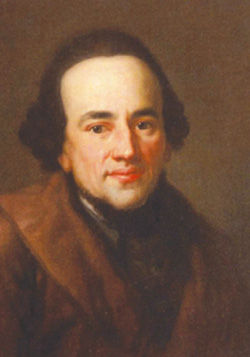22. Three aphorisms from Diderot, The Eleutheromaniacs, 1772; Rousseau, The Social Contract, 1766; and Moses Mendelssohn (1729-1786), Morning Hours, 178637
The child of nature always detests slavery:
Merciless enemy of all authority,
He rejects the yoke, is revulsed by constraint;
Liberty is his vow, Liberty his cry.
Diderot
Whoever dares to say that ‘without the church there is no salvation’ deserves to be hounded from the State, unless the State is the Church, and its prince is the pontiff. Such a dogma only works in a theocracy, and for any other government it is harmful.
Rousseau
My fear is that, when all is said and done, this famous debate between materialists, idealists and dualists will be nothing more than a verbal quarrel, better suited to the linguist than to the speculative philosopher.
Mendelssohn

Portrait of Moses Mendelssohn after Anton Graff (1771): https://commons.wikimedia.org/wiki/File:Moses_Mendelson_P7160073.JPG
Read the free original text online (facsimile) of Diderot’s Ouvres, III, 1821 edition: https://books.google.co.uk/books?id=Rd5ewRvz0qMC&pg=PA461
Read the free original text online (facsimile) of Rousseau’s Contrat social ou principes du droit politique, 1766 edition: https://books.google.co.uk/books?id=xmEHAAAAQAAJ&pg=RA1-PR37
Read the free original text online (facsimile) of Mendelssohn’s Morgenstunden, 1786 edition: https://books.google.fr/books?id=azQtawSj7UUC&pg=PA116
37 Denis Diderot, ‘Les Eleuthéromanes, ou les furieux de la liberté’, in his Œuvres de Denis Diderot, Paris: Brière, 1821, III, pp. 467-468; Jean-Jacques Rousseau, Du contrat social, 1762, Book IV, ch. 8, Geneva: chez Marc-Michel Bousquet, 1766, p. 268; Moses Mendelssohn, Morgenstunden, Berlin: 1786, I, p. 116.







